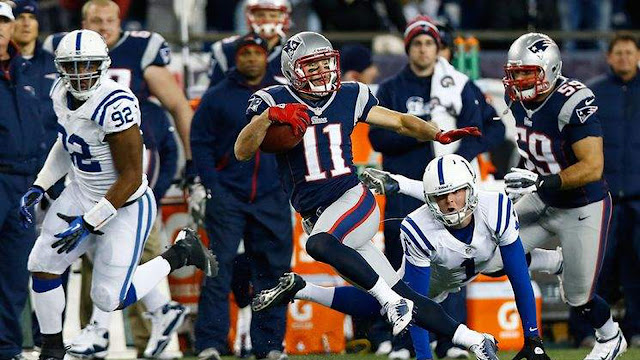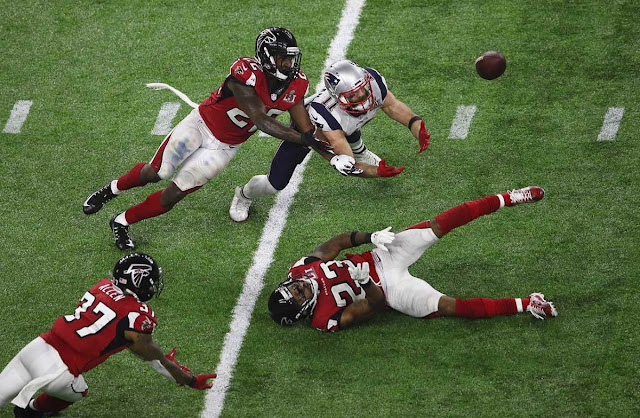Does Julian Edelman belong in the Hall of Fame?
Legacy. How do you measure legacy? How do you rank and compare legacies? It’s impossible to definitively answer those questions. Legacies are intangible, they're subjective. Nevertheless, the American sports world, particularly, is infatuated with the idea of ‘leaving a legacy’.
Nothing signifies this more than the multiple Hall of Fames dotted around the country commemorating those supposed to be among the greatest ever in their field. Being inducted into a Hall of Fame is perhaps the clearest way to identify the magnitude of anyone's legacy.
Whenever a player retires, at least a player who has endured or been particularly successful, whether they deserve to be memorialized among the greatest or most influential players of all time is immediately asked.
Some players leave no doubt – they transcend the sport they
played and are held as sporting idols, shoo-ins for any memorial to their field
– but others command a fierce debate. A huge aspect of the debate comes down to
how you measure legacy, how you measure a player’s greatness compared to others
at different positions, in different eras, with so many metrics of ‘greatness’.
On April 12th, Julian Edelman announced his
retirement. The receiver walked away after 12 years in the NFL, all with
the New England Patriots, after having his contract terminated with a failed physical.
The Hall of Fame discussion has simmered around Edelman since his performance in Super Bowl LIII. With Tom Brady leaving New England after 2019, and Edelman himself coming off a
down year entering his age-34 season, his retirement appeared near enough to
seriously consider his Hall of Fame candidacy – the fact it
prompts a conversation is a resounding testament to his career in itself.
Unsurprisingly, it quickly divided
fans, players, and pundits. Those
denying his worthiness quoted his lack of regular season statistics, having
never been a ‘dominant’ receiver in the mold of Julio Jones or Calvin
Johnson, or for having been a product of Tom Brady and the Patriots. While those supporting his candidacy cited his postseason
success and a highlight reel of profoundly important plays to one of the greatest dynasties across all sport.
Edelman’s career is an incredible one. His journey to the
NFL alone was a longshot, starting at the College of San Mateo before transferring to Kent State and starting at QB. He was drafted in the seventh round (232 overall) of the 2009 NFL Draft and transitioned to receiver,
at least as far as the depth chart is concerned.
Over the next 12 years with the Patriots, Edelman epitomized the
team-first mentality called for by every team-sport-coach the world over. He
arrived in New England as a college QB, found a role as a fill-in at literally
whatever position his team needed, and eventually became one of the most
important Patriots' players of the decade not named Tom Brady – if not the most
important.
He brought profound character and energy to a much-maligned
Patriots team – offense at least – for having no personality or energy, or
being dry and uninteresting, and you could see him galvanize the entire team.
During
his time as a starter after Wes Welker's departure – 2013-2020 – he twice surpassed 100 catches, and twice
came close with 98 and 92. In that span he played 89 games, the equivalent of
five and a half seasons, and amassed 551 of his 620 career receptions, 6,108 of
his 6,822 career yards, and 32 of his 36 career touchdowns. That’s an average
of 99 catches, 1098 yards, and six touchdowns per 16 games. He was a reliably elite slot receiver.
That’s not to mention his impact all over the field for the Patriots. He played snaps on defense, recording tackles and QB pressures. He was a special teams ace as a gunner, and his value as a punt returner was immense. He is the Patriots punt return touchdown (four) and punt return average leader (11.2 yards per return, minimum 75 returns) and one of the most respected and feared punt returners in the NFL.
All-Pro punter Pat McAfee said: “Until Tyreek Hill
started returning punts, he was the guy I feared most as a punt returner.
“NFL Network asked me to rank my top five most feared punt
returners and I put him at number one. This guy scares the shit outta me.”
For Edelman, though, those numbers and his impact in the regular season are truly the tip of the iceberg.
Edelman found another level in the Playoffs. With the stakes raised, in the games which really matter the most, Edelman could be found making the biggest plays, and was the man Brady would often go to in those situations.
He leaves the NFL as the league’s second most prolific
postseason receiver in yards and receptions, behind only Jerry Rice. In 19 games he amassed 118 catches for 1,442 yards and five touchdowns. In his eight years as a starter, through 15 playoff games, he had a stat line of 109 catches, for 1,367 yards and three touchdowns, and won
three Super Bowls, earning MVP honors in Super Bowl LIII. Those numbers would still make him the second most productive postseason receiver.
However, his individual moments leave the largest legacy. Be it his Super Bowl XLIX heroics against the Seattle Seahawks; his double pass touchdown to Danny Amendola against the Baltimore Ravens in the 2015 AFC Championship game; the catch against the Atlanta Falcons in Super Bowl LI; his key third down conversions against the Kansas City Chiefs in the 2018 AFC Championship game; or his MVP performance in Super Bowl LIII.
The bottom line is that Edelman thrived at the times the stakes were the highest they will ever be. All football is played in the pursuit of one trophy. The regular season exists to lead to the postseason, which exists to bring about the Super Bowl.
If a player dominates the game and is more
physically talented than their peers - Calvin Johnson, Randy Moss, and Dan Marino, for example - they deserve to be honored in the museum of the sport. It's very relevant if they simply played the game better than most ever have.
But that doesn’t discount a player's worthiness if they consistently produced in the
biggest moments the game has to offer.
Furthermore, there is a separation between slot receiver and outside receiver. They're greatly different positions with vastly differing statistics and whose play looks entirely different. Nevertheless, the slot receiver is equally as important, and deserves its place in Canton.
Edelman’s impact on the game of football is one of elite production within the prism of his position. He may not have dominated in the way receivers are expected to, with gaudy numbers and hulking highlights of physical domination, but he dominated within his role.He played with brutal quickness and was virtually uncoverable from the slot on a regular basis - he really earned his 'Squirrel' nickname. He added immense toughness, with an uncanny ability to take huge hits, bounce off contact, and yet always come back for more.
He is also of priceless importance to the Patriots' 2010s dynasty. He is a foundational piece of the most successful team of the decade to an entire generation of sports fans. That is a monumental imprint to leave on a sport with as many generational icons as football has.
A significant aspect of Hall of Fame candidacy is if you can tell the story of the game, or a team, or an era, without mentioning the player. You cannot tell the story of the NFL through the 2010s without Edelman being a recurring character.
Julian Edelman is one of the greatest slot receivers to ever play; is one of the greatest postseason performers of all time; has won the greatest prize the game has to offer, three times; and is an icon for an entire generation of one of the greatest sporting dynasties we've ever seen.
Julian Edelman deserves to be in the Hall of Fame.







Comments
Post a Comment